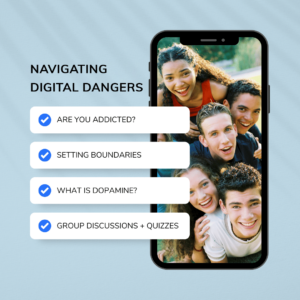Description
Navigating Digital Dangers
Our Mission: We aim to create a future where teens and tweens possess the requisite skills to successfully navigate the complexities of the digital world to protect their minds, bodies, and reputations from predators of all sorts who would use them for purposes that are often in direct opposition to the core values we are trying to instill in them.
Why We Need to Teach This
- The strength, scope, power, and sway of the digital world demands skills for successful navigation. These skills are currently not being consistently taught on a large scale.
- Since Nature abhors a vacuum, the need for a formal plan to teach these skills will inevitably be filled by someone or something. We have the opportunity (and the responsibility) to fill this void with an established paradigm following accepted standards.
- In an age of increased awareness of the importance of child autonomy, it makes sense to empower students to manage their own digital footprints. If we don’t, what are the alternatives?
- A set of arbitrary rules based on rapidly changing platforms and digital offerings.
- Allowing predators to take advantage of students’ lack of knowledge and/or power.
- As the digital world and artificial intelligence grows, it will become increasingly important to plant the seeds of resilience in the next generation. Resilience to coercion is the ultimate way to keep students safe now and into adulthood.
- The dangers are real.
-
- The TikTok app now allows air-dropping one’s name, voice, and pictures to everyone nearby without consent.
- Suicide, especially among girls ages 12-24 is at an all-time high with many experts blaming social media.
- Challenges presented on social media sites have caused much damage and many injuries.
- Predators pose as age-appropriate “friends” to lure teens into meeting them in person.
- Software used by companies tracks every “like” on social media that teens make, every website they visit, and every item entered in search engines to manipulatively tailor advertising to them in a practice called surveillance capitalism.



Reviews
There are no reviews yet.